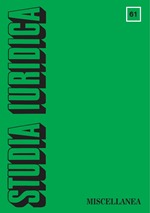Satyra antyczna a współczesne standardy prawne wypowiedzi prasowej
Ancient Satire and Modern Legal Standards of Press Statements
Author(s): Waldemar GontarskiSubject(s): Law, Constitution, Jurisprudence, Civil Law, Communication studies
Published by: Wydawnictwa Uniwersytetu Warszawskiego
Keywords: Aristotelian truth; diligence; material truth; middle; objective truth; satire – subjective truth; personal attack
Summary/Abstract: The contemporary truth which applies to journalists (as required by the Council of Europe standards and domestic law) reflects differences between the essence and criterion of Aristotelian truth (material truth – veritas est adaequatio rei et intellectus – ad Aristotle, The Metaphysics IV.7. [1011b 26‒27]), and its practical implementation (objective truth – in medio stat veritas – ad Aristotle, Nicomachean Ethics II.7. [1108a 19‒20]). A journalist is obliged to reconstruct the objective truth (the truth ascertainable by a man who meets the Roman law standard of diligentia boni patris familias, here referred to as diligence expected of a responsible journalist) and not the material truth. Nonetheless, a substantial discrepancy between this journalistic truth and the material truth will constitute a sufficient reason for statutory rectification. As regards the assessing statements, as well as the satirical ones, the proof of truth is only required if the assessment is a conclusion derived from descriptive statements, i.e. the factual basis, and that conclusion must be logical (proportional and therefore just). Satire may not contain words commonly considered as offensive. If a satirical statement is to enjoy the legal protection, it cannot amount to a mere personal attack. Regardless of the fact that satire is a negative assessment and an exaggerated one, it must derive from application of facts, meaning that it must reflect the reality and in that sense it can neither attack human dignity nor contain any discriminatory statements, as confirmed by the latest case law of the Court of Justice of the European Union. Analogical conclusions can be reached upon reading the works of Romanian satirists, for instance Horace.
Journal: Studia Iuridica
- Issue Year: 2015
- Issue No: 61
- Page Range: 53-125
- Page Count: 73
- Language: Polish

